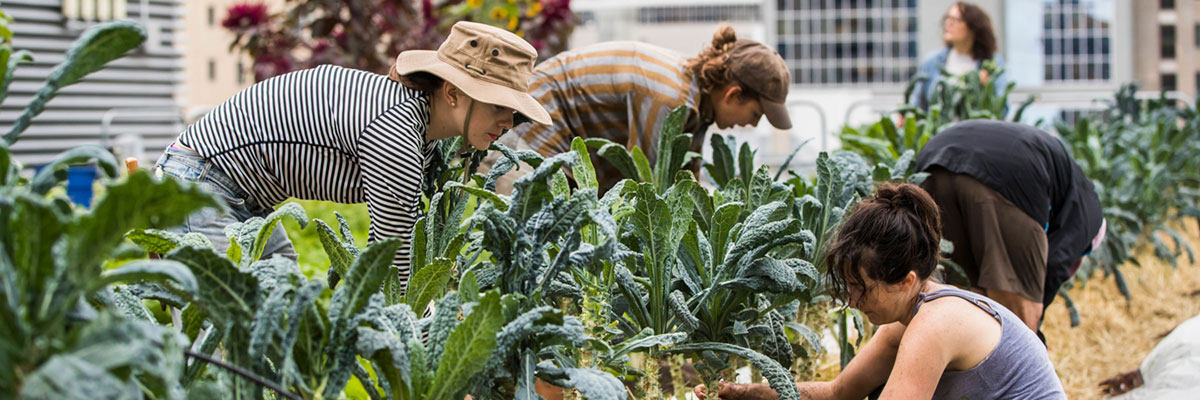Food

The university is committed to creating a food system based on community building and mindful eating through the design of food spaces, procurement of sustainable food, and the reduction of food-related waste. Departments and groups across the university work collaboratively to address food system challenges at multiple levels.
The Sustainability Office aims to promote resilient food systems on campus by working with campus partners to:
Increase awareness of the benefits of sustainable food choices and the connection between our campus food system and climate change.
Realize the ecological and social impacts of food production, procurement and consumption on campus.
Reduce food-related waste on campus.
Key Campus Contributors
TMU Eats
TMU Eats is dedicated to ensuring access to affordable, sustainable, and culturally meaningful food on campus. Their team is continuously looking for opportunities to advance sustainability practices. In fact, more than almost 40% of their ingredients are purchased from local producers (within 400km of TMU) like the Urban Farm at TMU.
Additional initiatives include:
TMU Eats has introduced the OZZI reusable to-go container program to the Pitman and ILC dining halls to reduce waste and single-use food packaging on campus by encouraging students, faculty and staff to forgo disposable containers for a more sustainable takeout option. Each reusable to-go container is 100% recyclable and can be used up to 300 times.
For those who do not choose to participate in the OZZI reusable container program, TMU Eats offers compostable containers at all retail food outlets.
The Sustainability Office partnered with TMU Eats to give out 975 reusable bamboo cutlery sets to all incoming residence students in Fall 2021 in an effort to reduce the use of disposable plastic cutlery in residence dining halls.
TMU Eats provides professional training for their chefs under the Forward Food Program (external link, opens in new window) developed by the Friends of Humane Society International. The hands-on training program teaches food service professionals how to incorporate plant-based foods into their menus and place sustainability at the centre of their menu decisions.
Ocean Wise (external link, opens in new window) is a conservation program created to help businesses and their customers identify and purchase sustainable seafood. TMU Eats is working directly with Ocean Wise to source and offer more sustainable seafood options on campus. Look for the Ocean Wise logo on dining hall menus to easily identify and choose products that ensure the health of our oceans for generations to come.
Green Restaurant Association certification (external link, opens in new window) recognizes restaurants that have incorporated ecological sustainability into their operations. Receiving one of the highest scores of any Canadian post-secondary food service provider, the Pitman Dining Hall is a 3 Star Certified Green Restaurant® under the Green Restaurant Association's rigorous standards in categories like water efficiency, waste reduction, sustainable food, and chemical and pollution reduction.
Canadians throw away on average 14 billion single-use cups every year. Coffee cups are one of the main contributors to TMU’s waste stream. In an effort to encourage a zero-waste lifestyle, TMU Eats offers a $0.10 discount for students, faculty or staff who bring their own mug to the hub cafe. This program is currently on hold during the COVID-19 pandemic.
After listening to the university community, it was clear that plastic straws and stir sticks were not welcome on campus. TMU Eats moved quickly to phase them out of all university-owned locations and replace them with paper straws and biodegradable stir sticks. These actions have resulted in reduced waste and a step towards zero-waste at Toronto Metropolitan University.
Urban Farm green roofs and gardens
The Urban Farm at TMU (external link) demonstrates the potential for ecological rooftop farming in one of Canada’s most densely populated neighbourhoods.
Founded as a student-led initiative in 2011, the Urban Farm has since evolved into two growing spaces on university rooftops employing spray-free, ecological growing methods. A part of University Business Services, the Urban Farm produces more than 40 crops and 100 cultivars on a quarter acre of growing space each year and engages the community through programming and events. The Urban Farm’s Indigenous Foodways and Black Food Sovereignty initiatives grow culturally significant crops and medicines on the farm for use by the community.
Annually, the Urban Farm produces roughly 8,000 to 10,000 lbs of produce, distributed through a Model of Thirds approach that dedicates a third of produce for donation to community organizations, a third sold at affordable rates directly to students and a third sold at market price to the community, including local chefs.
The Urban Farm also operates a Living Lab, bringing together academics, community partners and urban farmers to conduct collaborative, interdisciplinary research on the rooftop farms that addresses the challenges of designing and operating rooftop farms using green roof technologies.
In 2020, the Urban Farm added a second rooftop farm atop the Daphne Cockwell Health Sciences Complex, which is the first purpose-built rooftop farm established under the City of Toronto’s Green Roof By-Law (external link, opens in new window) for food production.
Additional initiatives on campus

The Good Food Centre (external link)
The Good Food Centre works to reduce the impacts of food insecurity for all TMU community members. By building capacity through emergency food relief, skill building, and education, it aims to ensure equitable food access to students and a sense of community.

Centre for Studies in Food Security
The Centre for Studies in Food Security (CSFS) works to promote food security through research, dissemination, education, community action, and professional practice.